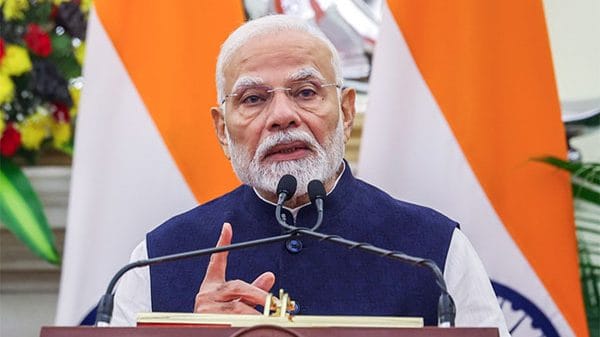Thank you dear subscribers, we are overwhelmed with your response.
Your Turn is a unique section from ThePrint featuring points of view from its subscribers. If you are a subscriber, have a point of view, please send it to us. If not, do subscribe here: https://theprint.in/subscribe/
We are all too familiar with the Emergency of 1975—one of the darkest chapters in India’s
democratic history. Authoritarian as it was, Indira Gandhi retained loyalty to the principles of the constitution and governed more or less by the books.
Yes, civil liberties were curtailed, and personal freedoms trampled upon, but there remained a thread of obedience to legal norms. In fact, Gandhi called off the emergency and subjected her regime to the ultimate litmus test of democracy—by calling for elections in 1977, banking on the judgment of the people. The response from the people was a loud rejection of autocracy.
Today, nearly half a century later, we are living under an “undeclared emergency.” Unlike Gandhi, who operated in a reactive mode, Modi appears to have a long-term vision that fundamentally aims to reshape the Indian socio-political landscape: He wishes to establish a Hindu Rashtra, a nation where minorities become second-class citizens. This vision involves a deliberate centralization of power that not only threatens to dismantle the federal structure, thereby undermining regional autonomy and diversity, but also seeks to impose Hindi as the dominant national language, potentially alienating non-Hindi speaking states.
His governance style risks reducing Parliament to a mere rubber stamp for executive decisions, eroding its role as a forum for constructive debate and legislation. Concurrently, the judiciary faces the peril of being sidelined and stripped of its legitimacy.
Even without the formal declaration, key institutions like the CBI, Income Tax, Enforcement Directorate, SEBI, and notably, the media, have all seemingly surrendered to government and party directives. In this undeclared emergency, Modi has waged a war on the people of unprecedented proportions. He declared war on the common man when he unilaterally ‘demonetized’ the currency overnight, leaving people stranded on the streets.
With the arrogance of a monarch decreeing his whims, Modi announced to the nation that their hard-earned currency was now worthless. It was a slap in the face to the poor, the marginalized, the ones who barely scraped by each day, as their little savings evaporated into thin air.
He didn’t stop there. He forcefully imposed the Aadhaar card enrollment on citizens, choking them with bureaucratic red tape and intrusive surveillance. Simultaneously, we are witnessing a dangerous advancement of capitalist hegemony, as public sectors are rapidly being privatized.
Dissent is brutally suppressed, and opposition voices are stifled through draconian measures. If you criticize the government, you will be branded as ‘Urban Naxal.’ Should you advocate for social justice, you will be labelled as ‘liberal elitist’ or ‘left-wing extremist.’ Should you
advocate for minority rights, you will be branded as ‘anti-Hindu’ or ‘appeaser.’ If you question the government’s cozy relationship with big business, you will be dismissed as a ‘communist sympathizer.’ Should you express concerns about environmental ruin, you will be labelled as a ‘tree-hugger’ or ‘anti-development.’ Should you challenge the government’s narrative on national security or military actions, you will be branded as ‘pro-Pakistan’ or ‘anti-Indian.’ Should you question the government’s human rights abuses, you will be labelled as a ‘foreign-funded NGO’ or ‘American puppet.’
The rot runs deeper still. Since the days of Partition in 1947, never has the air been so thick with hate speech, nor has communal harmony been so strained. More and more hardliners are calling for the demolition of mosques, and ‘Jai Shri Ram’ is being forced upon the lips of unwilling mouths.
Bear in mind that during Gandhi’s emergency, there was no open hatred towards a particular community, nor were there cries of ‘bulldozer justice’ meted out as retaliation. There was no communal hate-mongering tearing at the joints of our society, and no threat of Hindutva majoritarianism.
Our fathers did not witness the targeted killings of liberal intellectuals and journalists, nor did they fear the anger of cow vigilantes. The streets were free of religion-based senas and goons, untroubled by louts and lumpens harassing, extorting, and assaulting innocent bystanders with impunity. Private spaces and public places alike remained peaceful, untouched by the heavy hand of ideological extremism. People were free to choose what to eat and what to wear without fear of reprisal or judgment; moral policing had not yet encroached upon our public spaces. NGOs operated without the threat of forcible closure or fear of being accused of foreign agents. While censorship of the media existed, it did not extend to the near-total enslavement and ownership we see today.
If the past serves as a guide, it reminds us that the vigilance of a nation is often the only barrier between freedom and tyranny. The struggle may be different, but the stakes remain the same. Democracy cannot be taken for granted, nor can the idea of India; it must be actively defended, even against the silence of an undeclared emergency.
These pieces are being published as they have been received – they have not been edited/fact-checked by ThePrint.


